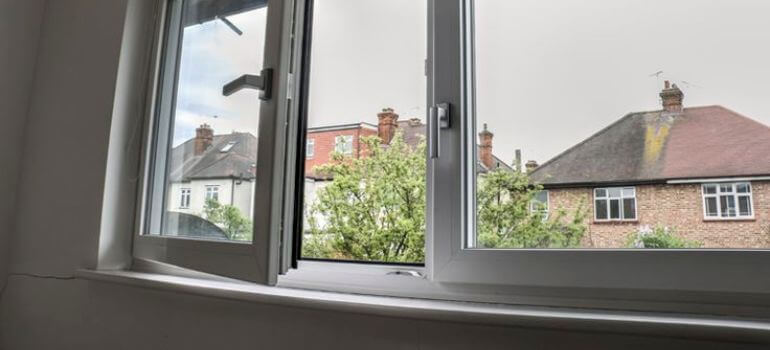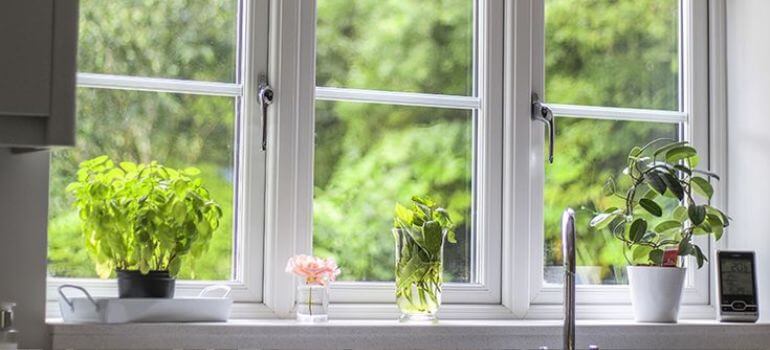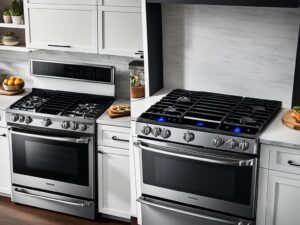When it comes to replacing your windows, there are a lot of options to consider, including the material the windows are made from. Two popular choices are vinyl windows and composite windows. While both have their benefits, they also have unique characteristics that vary in terms of durability, aesthetics, and cost.
Choosing between vinyl and composite windows can be overwhelming, but understanding the differences between the two can help make your decision easier. In this article, we will explore the benefits of each material, compare their features, and help you determine which one is the best replacement window option for your home.
Key Takeaways:
- Vinyl and composite windows are two popular choices for replacement windows.
- Choosing between the two requires careful consideration of their individual benefits and characteristics.
- Both vinyl and composite windows can enhance your home’s appearance, energy efficiency, and overall value.
- Determining the best replacement window option for your home ultimately depends on your specific needs, preferences, and budget.
- By comparing vinyl and composite windows, you can make an informed decision and choose the best windows for your home.
Understanding Vinyl Windows
When it comes to replacement windows, vinyl windows have become a popular choice amongst homeowners. One of the primary benefits of vinyl windows is their affordability when compared to other materials such as wood or fiberglass. Not only are vinyl windows cost-effective, but they are also low maintenance, making them an attractive option for those who do not want to spend a lot of time on upkeep.
Another significant advantage of vinyl windows is their energy efficiency. Vinyl windows have been engineered with insulation capabilities, which can help reduce the amount of energy used to heat and cool your home. With energy-efficient windows, you may be able to see significant savings on your utility bills in the long run.
Nowadays, there is a wide range of vinyl window styles and designs to choose from, making it easy to find the perfect fit for your home. Whether you are looking for a classic or modern look, vinyl windows can meet your design needs. Some of the vinyl window replacement options on the market include:
| Window Type | Description |
|---|---|
| Single-Hung Windows | This type of window has a fixed upper sash and a lower sash that slides up and down to allow ventilation. |
| Double-Hung Windows | Double-hung windows have two operable sashes that slide vertically in the frame and can tilt inwards, making cleaning a breeze. |
| Sliding Windows | These windows operate much like a sliding door, moving horizontally along the track. They are an excellent choice if you have limited vertical space available. |
| Casement Windows | Casement windows have a single sash that opens outwards with the help of a crank handle. They offer great ventilation and a modern look. |
Overall, vinyl windows are an affordable, low maintenance, and energy-efficient window replacement option. With many styles available, you can easily find one that suits your home’s unique aesthetic.
Exploring Composite Windows

Composite windows are becoming increasingly popular due to their numerous benefits. These windows are a blend of different materials, such as wood, vinyl, and fiberglass, that make them more durable and energy-efficient than single-material windows.
One of the major benefits of composite windows is that they offer enhanced durability and longevity. Unlike traditional wood windows, composite windows are resistant to rotting, warping, and fading, making them an ideal window replacement option for homes in areas with extreme weather conditions.
Composite windows are also highly customizable and can be designed to fit any architectural style. They come in a variety of colors and finishes, allowing you to tailor them to your specific aesthetic preferences.
Additionally, composite windows are energy-efficient, which helps to reduce your heating and cooling costs. They provide excellent insulation, minimizing air leakage and keeping your home comfortable year-round.
Window Replacement Options
There are several types of composite windows available on the market. Some of the popular ones include:
| Window Type | Overview |
|---|---|
| Wood Composite Windows | These windows are a combination of wood and thermoplastic materials that make them more durable and energy-efficient than traditional wood windows. They offer the warmth and beauty of wood with the longevity of composite materials. |
| Fiberglass Composite Windows | These windows are made of a strong and durable fiberglass frame with a composite exterior that provides excellent insulation and protection from the elements. They are low-maintenance and ideal for high-humidity areas. |
| Vinyl-Clad Composite Windows | These windows have a composite frame with a vinyl exterior that offers additional protection and energy efficiency. They are easy to maintain and come in a variety of colors and finishes. |
Composite windows are a great window replacement option to consider due to their durability, energy efficiency, and customization options. With several types of composite windows available, you can choose the one that fits your needs and budget.
Comparing Vinyl and Composite Windows
When it comes to selecting replacement windows for your home, choosing between vinyl and composite windows can be a challenging decision. Both materials offer unique benefits and considerations that can influence your final choice.
Construction
Vinyl windows are made of polyvinyl chloride (PVC) and are known for their durability and low maintenance requirements. Composite windows, on the other hand, are constructed using various materials, such as fiberglass, vinyl, and wood, to create a sturdy and sturdy frame.
Performance
Both vinyl and composite windows offer excellent energy efficiency and sound insulation. However, composite windows have a higher insulation value due to their multi-layered construction.
Durability
Vinyl windows are resistant to rot, insects, and moisture, making them an ideal choice for humid climates. Meanwhile, composite windows are highly durable and can withstand extreme temperatures and weather conditions, but they may require occasional repainting or refinishing to maintain their appearance.
Cost
Vinyl windows tend to be more affordable than composite windows due to their simpler construction and installation process. However, composite windows’ high-quality materials and construction result in a higher initial cost.
| Factors | Vinyl Windows | Composite Windows |
|---|---|---|
| Construction | PVC material | Various materials (fiberglass, vinyl, wood) |
| Performance | Good energy efficiency and sound insulation | Higher insulation value due to multi-layered construction |
| Durability | Resistant to rot, insects, and moisture | Highly durable, require repainting or refinishing |
| Cost | Affordable | Higher initial cost |
By comparing the differences between vinyl and composite windows, you can make an informed decision that best meets your specific needs and preferences. Consider the factors that are most important to you, such as durability, performance, and cost, to determine the right choice for your replacement windows.
Conclusion
After exploring the differences between vinyl and composite windows, it’s clear that both have their own unique benefits and considerations. Vinyl windows are a more affordable and low-maintenance option, while composite windows offer superior durability and aesthetic appeal.
Ultimately, the best replacement windows for your home will depend on your specific needs, budget, and preferences. Regardless of which material you choose, it’s important to select a reputable manufacturer and professional installer to ensure the windows are of high quality and properly installed.
Investing in replacement windows can greatly enhance your home’s appearance, energy efficiency, and overall value. By considering the information presented in this article, you can confidently select the best replacement windows for your home and enjoy the benefits of your new windows for years to come.
FAQ
What are the differences between vinyl windows and composite windows?
Vinyl windows are made from PVC (polyvinyl chloride) material, while composite windows are made from a blend of materials such as wood, fiberglass, and vinyl. Vinyl windows are known for their affordability and low maintenance, while composite windows offer a higher level of durability and aesthetic appeal.
How do I choose between vinyl and composite windows?
When choosing between vinyl and composite windows, consider factors such as your budget, desired level of maintenance, energy efficiency needs, and aesthetic preferences. Vinyl windows are a great choice for those on a tight budget, while composite windows are ideal for those seeking a more durable and visually appealing option.
What are the benefits of vinyl windows?
Vinyl windows are affordable, low maintenance, and energy efficient. They provide excellent insulation, reducing energy costs and noise transmission. Vinyl windows are also resistant to rot, peeling, and fading, making them a long-lasting choice for homeowners.
What are the benefits of composite windows?
Composite windows offer a combination of durability, strength, and aesthetic appeal. They can mimic the look of traditional wood windows while providing the low maintenance and superior insulation of vinyl windows. Composite windows are also resistant to warping, cracking, and fading, ensuring their longevity.
What are my window replacement options?
When considering window replacement options, you can choose from a wide range of styles, including double-hung, casement, slider, picture, and bay or bow windows. These options are available in both vinyl and composite materials, allowing you to select the style and material that best suits your home and personal preferences.
How should I compare vinyl and composite windows?
When comparing vinyl and composite windows, consider factors such as cost, maintenance requirements, energy efficiency ratings, durability, and aesthetic appeal. Additionally, consult with window professionals to understand the specific features and benefits of each material to make an informed decision.



